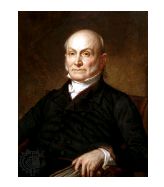The 12th Amendment to the Constitution of the United States provides for the election of the president and vice president by the electoral college, and if no candidate obtains a majority, the House of Representatives chooses the President.
The only president of the United States to be elected by the House of Representatives under the 12th Amendment is John Quincy Adams.

In 1824, four major candidates vied for the presidency: Andrew Jackson, John Quincy Adams, William H. Crawford and Henry Clay. In the election, John Quincy Adams received 40,000 fewer votes than Andrew Jackson – Jackson received 153,544 votes out of a total of 356,038 cast in that election. Adams also garnered fewer electoral college votes than Jackson (Jackson had 99, Adams 84 and the other 78 votes going to other candidates). Since no candidate had a majority of electoral college votes, the presidential election went to the House of Representatives to select the president from the top three electoral college vote recipients – Jackson, Adams and Crawford. Clay was eliminated from contention, having the lowest number of votes. But in addition to being a presidential candidate, Henry Clay was the powerful Speaker of the House at the time. He threw his support to Adams – the tale told that he did so in return for his appointment as Secretary of State. Clay's endorsement ultimately won the day: John Quincy Adams became president and Henry Clay was appointed Secretary of State, a position he held from 1825-1829.
This article is presented for informational purposes only and is not intended to constitute legal advice.
